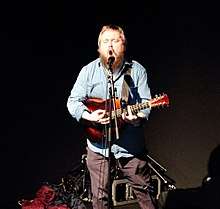Richard Dawson (musician)
Richard Dawson (born 1981)[1] is an English folk-influenced musician from Newcastle upon Tyne.[2] His 2014 album Nothing Important was released by Weird World and was met with critical acclaim.[3][4][5] His 2017 album Peasant received similar acclaim, and was chosen by The Quietus as their album of the year.[6] In 2019, he released the album 2020, again to critical acclaim.[7][8]
Richard Dawson | |
|---|---|
 Dawson performing in 2015 | |
| Background information | |
| Born | 1981 |
| Occupation(s) | Singer-songwriter, musician |
| Instruments | Vocals, guitar, keyboard, samplers |
| Website | http://www.richarddawson.net/ |
Career
Dawson grew up in Newcastle and became interested in singing as a child, attempting to emulate American singers such as Faith No More's Mike Patton.[9] He worked in record stores for 10 years before starting a professional music career. He bought an inexpensive acoustic guitar with nylon strings[3] but accidentally broke it. After the guitar was repaired, he found it had a unique sound and he now uses it as his main instrument.[2]
Dawson's approach at tackling blues music has been described as an English version of Captain Beefheart.[2][5] Dawson himself cites Qawwali,[9] a form of Sufi devotional music, Kenyan folk guitarist Henry Makobi[2] and folk musician Mike Waterson[10] as influences on his work. The albums The Glass Trunk (2013) and Nothing Important (2014) feature collaborations with harpist Rhodri Davies, who Dawson describes as "somewhat of a kindred spirit".[9][10] Dawson and Davies released a collaborative album, Dawson-Davies: Hen Ogledd,[11] in 2013 and Dawson has also released solo material pseudonymously under the name "Eyeballs". Richard has also performed in the groups Hot Fog with Mike Vest (Bong), Moon with Ben Jones and Sarah Sullivan (Jazzfinger) and played a handful of shows on guitar with Khunnt.[10]
Since Nothing Important, Dawson has played the guitar through a Fender and an Orange amplifier in series.[9] He also used synthesized sounds from an iOS application, ThumbJam, and played saxophone despite having only a rudimentary knowledge of the instrument.[9]
Lyrically, Dawson's material deals with dark subjects such as death. For The Glass Trunk, he searched a database in the Tyne and Wear archives for "death" and took inspiration from old news stories involving murder and bodily harm.[3][12] The track “The Vile Stuff” from Nothing Important describes a continuous narrative of events, including one where Dawson pierced his hand with a screwdriver attempting to crack a coconut shell while on a school trip.[5]
Discography
Albums
- Richard Dawson Sings Songs and Plays Guitar (2007)
- The Magic Bridge (2011)
- The Glass Trunk (2013)
- Nothing Important (2014)
- Peasant (2017)
- 2020 (2019)
- Republic of Geordieland (2020)
Collaborations
- Dawson May Jazzfinger Clay with Nev Clay, Ally May and Jazzfinger (2009)
- Moon - Diseasing Rock Who (2011) with Ben Jones and Sarah Sullivan
- Dawson-Davies: Hen Ogledd with Rhodri Davies (2013)
- Hen Ogledd with Rhodri Davies and Dawn Bothwell: Bronze (2016)
- Hen Ogledd with Rhodri Davies, Dawn Bothwell and Sally Pilkington: Mogic (2018)
- Hen Ogledd with Rhodri Davies, Dawn Bothwell and Sally Pilkington: Free Humans (2020)
Soundtracks
- Motherland (2008)
As Eyeballs
- Europa (2008)
- The Roof of The World (2008)
- Sea of William Henry Smyth (2008)
- Seal-Skin Satelite (2008)
- The Invisible Castle (2009)
- The Quest (2009)
- Thief of Men (2009)
- Treasure' (2009)'
- Eyeballs/Gareth Hardwick split (2009)
- Eyeballs/White Dwarf Spiral split (2009)
References
- Rogers, Jude (26 October 2019). "Richard Dawson: anthems for a blighted nation". The Guardian.
- Weingarten, Christopher R. (November 2014). "Richard Dawson – Dej Loaf, Oliver Heldens and 8 More New Artists You Need to Know | Rolling Stone". Rolling Stone. Retrieved 15 December 2014.
- Cook-Wilson, Winston (5 November 2014). "Richard Dawson: Nothing Important". Pitchfork Media. Retrieved 15 December 2014.
- Gardner, Noel (1 November 2014). "NME Reviews – Richard Dawson – 'Nothing Important'". NME. IPC Media. Retrieved 15 December 2014.
- Hann, Michael (20 November 2014). "Richard Dawson: Nothing Important review – remarkably original folk". The Guardian. Retrieved 16 December 2014.
- Riley, Danny (1 June 2017). "The Quietus | Reviews | Richard Dawson". The Quietus. Retrieved 24 December 2017.
- Beaumont-Thomas, Ben (2019-10-11). "Richard Dawson: 2020 review". The Guardian. ISSN 0261-3077. Retrieved 2020-01-29.
- "Richard Dawson – 2020 – Album review". Loud And Quiet. Retrieved 2020-01-29.
- Nugent, Cian (3 December 2014). "Richard Dawson by Cian Nugent". Bomb magazine. Retrieved 16 December 2014.
- McKeating, Scott (26 February 2013). "The Ancestor's Tale: An Interview With Richard Dawson". The Quietus. Retrieved 16 December 2014.
- Bliss, Abi (November 2014). "Galaxy of Scars". The Wire. The Wire Magazine Ltd. (369): 40. Retrieved 16 December 2014.
- Wheeler, Harry (5 March 2014). "Richard Dawson – The Glass Trunk". Folk Radio. Retrieved 16 December 2014.